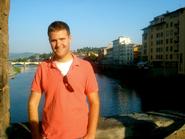
African asylum-seekers and refugees who go to Israel are frequently either turned away or face very difficult conditions. Henry Anreder '12, a recipient of a Levitt Research Fellowship Grant, is exploring the issues surrounding African refugees in Israel for his project with Professor of Government Steve Orvis.
The project is titled “Comparative Effectiveness of Governmental Agencies and Non-Governmental Organizations in the Assistance of African Refugees in Israel.” Anreder is conducting research both in Israel and in the States to compile a comprehensive resource for anyone interested in learning more about this divisive subject.
It is important to note the distinction between asylum-seekers and refugees in Israel. Anybody from Eritrea or Sudan who can prove their identity is granted asylum, which consists of a three-month renewable visa. Newcomers from these two countries make up 80 percent of people coming into Israel from Africa. People from other, less obviously brutal countries rarely obtain this status, and the process to apply for refugee status is lengthy and complex. Generally official refugee status is hard to obtain because Israel has no definite law regarding refuges. In fact, approximately 180 official refugee statuses have been granted in Israel’s entire history. According to international law, these refugees should be able to obtain full citizenship status, but even these 180 people have had to renew their visas annually.
Israel is a particularly attractive place to seek asylum or refugee status because it is the only country in the area with such levels of economic opportunity. The African immigration to Israel started several years ago, and asylum-seekers cite unlivable conditions in their home country as their motive for leaving. For example, Eritrean immigrants frequently want to escape the forced military service in Eritrea which lasts for unspecified periods of time. Asylum seekers travel through dangerous conditions to cross the border into Israel, where they may find themselves ultimately unwelcome.
Part of the problem lies with Israel’s self-definition as a Jewish state; if too many non-Jews are allowed to become citizens, many Israelis fear that the country will lose its Jewish character. Israel must already deal with Palestinian refugees in surrounding Middle Eastern countries who wish to enter Israel in order to undermine its Jewish nature. The majority of Israelis oppose the asylum-seekers and call them by the Hebrew word for “infiltrators.” Some residents of south Tel Aviv have even started racist hate groups that focus on combating immigration from Africa. However, the population is largely divided over the proper course of action to take, and many northern Tel Aviv residents side with the African residents.
During his time in Israel, Anreder has gathered information from various NGOs that aim to give legal, humanitarian, medical and psychological aid to the asylum-seekers and refugees. He is also taking interviews from professors to gain an academic perspective on the matter, as well as a pending interview with a government official. His goal is to complete an organized compilation of the various interviews he has conducted and opinions he has heard. Ultimately, Andreder’s project will provide a wealth of information about Israeli culture and policies.
Anreder was attracted to this particular project because of a general fascination with Israel as well as his interest in this particular subject. Having spent a summer as an intern for the New Israel Fund in the US, Anreder was already familiar with some the NGOs that he has he observed for this project. His semester in Israel helped further expose him to that culture. He wants his project to shed light on the issues surrounding African immigrants to Israel, as most information about refugees in Israel deal with the Arab-Israeli conflict and not with Africans.
African immigration into Israel highlights elements of Israel’s governmental and social structures that may not be immediately visible to outsiders. The issue is incredibly complex and there are many ways to approach a solution. Anreder hopes that his work will illuminate this tense area of life in Israel.
Henry Anreder is a graduate of Southampton High School (N.Y.)
